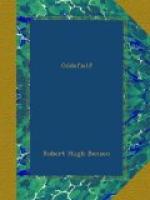“If it is not done to-day, it will never be done.”
Looking back on the affair now, I truly do wonder at the adroitness with which we both talked. There was scarcely a slip on either side, though we were at cross-purposes if ever men were. But I suppose that in both of us there was a very great tension of mind—as of men walking on the edge of a precipice; and it was the knowledge of that which saved us both. After dinner I said I would walk again out of doors; and he thought it was mere affectation, since I must know by now that His Majesty was not coming.
“Well,” I said, “if by any mischance His Majesty doth not come to-day, I will get back to town.”
He looked at me; but he kept any kind of irony out of his face.
“You had best do that,” he said.
* * * * *
Now it must have been forty miles from Newmarket to the Rye; and I had calculated that His Majesty would not start till nine o’clock at the earliest. He would have four horses and would change them at least three times; but they would not be able to go out of a trot for most of the way, so that I need not look for any news of him till three o’clock at the earliest. From then till five o’clock would be the time. If he were not come by five, or at the very latest half-past, I should know that my design had miscarried.
It is very difficult for me to describe at all the state I was in—all the more as I dared not shew it. It was not merely that my Sovereign was at stake, but a great deal more than that. My religion too was in some peril, for if, by any mischance things should not go as I expected; if, as certainly occurred to my mind as one possibility in ten, I had completely mistaken Rumbald, and he had spoken the truth for once—it was not the King only who would perish, but the Catholic heir also, and then good-bye to all our hopes. Yet, I declare that even this did not affect me so much as the thought that it was the man whom I had learned to love that was in peril—to love, in spite of his selfishness and his indolence and his sins. It was all but an intolerable thought to me that that melancholy fiery man who had so scolded me—whom, to tell the truth, I had scolded back—that this man might, even in imagination, be mixed up with the horror of the firing of guns and the plunging of the wounded horses—should himself be shot at and murdered, there in the lonely Hertfordshire lane.
At about three o’clock I could bear it no more. God knows how many prayers I had said; for I think I prayed all the time, as even careless men will do at such crises. There was the grim house behind me, the leafless trees overhead, the lane stretching up northwards beyond the gate. All was very silent, except for the barking of a dog now and again. It was a very solitary place—the very place for a murder; there were no meadows near us, where men might be working, but only the deep woods. It was a clearish kind of day, with clouds in the west.




